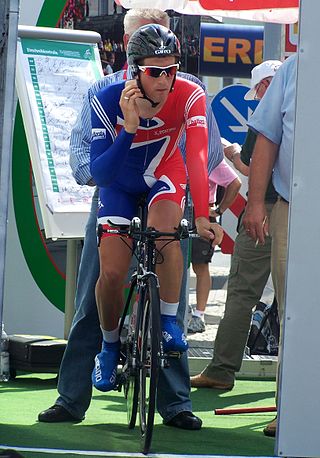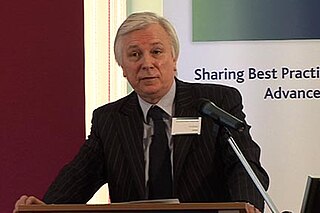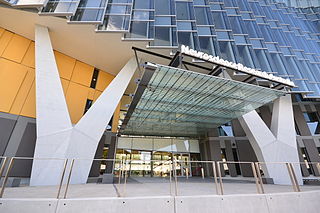Related Research Articles

Jacob Bronowski was a Polish-British mathematician and philosopher. He is best known for developing a humanistic approach to science, and as the presenter and writer of the thirteen-part 1973 BBC television documentary series, and accompanying book, The Ascent of Man. He was widely regarded as "one of the most revered intellectuals on the global stage."
Timothy John Crow, was a British psychiatrist and researcher. Much of his research was related to finding the causes of schizophrenia. He also had an interest in neurology and evolutionary theory. He was the Honorary Director of the Prince of Wales International Centre for Research into Schizophrenia and Depression. He qualified at the Royal London Hospital in 1964 and obtained a PhD at the University of Aberdeen, Scotland in 1970. He was a Fellow of the Royal College of Physicians, the Royal College of Psychiatrists and the Academy of Medical Sciences. Crow was, for twenty years, Head of the Division of Psychiatry of the Medical Research Council (MRC) Clinical Research Centre at Northwick Park Hospital and then a member of the External Scientific Staff of the MRC in Oxford.
In philosophy and neuroscience, neuroethics is the study of both the ethics of neuroscience and the neuroscience of ethics. The ethics of neuroscience concerns the ethical, legal, and social impact of neuroscience, including the ways in which neurotechnology can be used to predict or alter human behavior and "the implications of our mechanistic understanding of brain function for society... integrating neuroscientific knowledge with ethical and social thought".

Susan Adele Greenfield, Baroness Greenfield, is an English scientist, writer, broadcaster and member of the House of Lords. Her research has focused on the treatment of Parkinson's disease and Alzheimer's disease. She is also interested in the neuroscience of consciousness and the impact of technology on the brain.

The University of Auckland Faculty of Medical and Health Sciences was established in 1968 as The University of Auckland School of Medicine at its present site in Grafton, Auckland. Prior to this, the University of Otago had taught some students from the final years of its medical course in Auckland through a branch faculty of the Dunedin School of Medicine.
Cambridge University Hospitals NHS Foundation Trust is a British public sector healthcare provider located in Cambridge, England. It was established on 4 November 1992 as Addenbrooke's National Health Service Trust, and authorised as an NHS foundation trust under its current name on 1 July 2004.

Tipu Zahed Aziz was a Bangladeshi-born British professor of neurosurgery at the John Radcliffe Hospital in Oxford, Aarhus Denmark and Porto, Portugal. He specialised in the study and treatment of Parkinson's disease, multiple sclerosis, dystonia, spasmodic torticollis, fixed abnormal posture of the neck, tremor, and intractable neuropathic pain. Besides his medical work, he was also notable as a public commentator in support of animal experimentation.

Sir Michael Parkinson was an English television presenter, broadcaster, journalist and author. He presented his television talk show Parkinson from 1971 to 1982 and from 1998 to 2007, as well as other talk shows and programmes both in the UK and abroad. He also worked in radio and was described by The Guardian as "the great British talkshow host".

The Royal Photographic Society of Great Britain, commonly known as the Royal Photographic Society (RPS), is one of the world's oldest photographic societies. It was founded in London, England, in 1853 as the Photographic Society of London with the objective of promoting the art and science of photography, and in 1853 received royal patronage from Queen Victoria and Prince Albert.

Chronic traumatic encephalopathy (CTE) is a neurodegenerative disease linked to repeated trauma to the head. The encephalopathy symptoms can include behavioral problems, mood problems, and problems with thinking. The disease often gets worse over time and can result in dementia.

Jonathan Bellis is a Manx former racing cyclist from Douglas, who rode professionally between 2008 and 2015 for the Saxo Bank–SunGard, An Post–Sean Kelly, Christina Watches–Dana and ONE Pro Cycling teams. He represented Great Britain on the track and the roads. Bellis briefly worked as a directeur sportif for UCI Women's Team Drops in 2019, but was suspended, after being convicted of assault.
Trevor William RobbinsCBE FRS FMedSci is a professor of cognitive neuroscience and the former Head of the Department of Psychology at the University of Cambridge. Robbins interests are in the fields of cognitive neuroscience, behavioural neuroscience and psychopharmacology.

Andrew John Lees is an English physician who is Professor of Neurology at the National Hospital for Neurology and Neurosurgery, Queen Square, London and University College London. In 2011 he was named as the world's most highly cited Parkinson's disease researcher.

Neuroscience Research Australia is an independent, not for profit medical research institute based in Sydney, Australia. The institute is made up of over 400 researchers specialising in research to improve the lives of people living with brain and nervous system disorders. The institute’s research spans neurodegeneration, including dementia and Parkinson’s disease; mental health and mental illness including bipolar disorder and schizophrenia; and translational neuroscience including falls prevention, pain and injury prevention.
Andrea Hilary Brand is the Herchel Smith Professor of Molecular Biology and a Fellow of Jesus College, Cambridge. She heads a lab investigating nervous system development at the Gurdon Institute and the Department of Physiology, Development and Neuroscience. She developed the GAL4/UAS system with Norbert Perrimon which has been described as “a fly geneticist's Swiss army knife”.

Jonathan Peter Williams is a professional footballer who plays as a midfielder for EFL League Two club Gillingham. He retired from international football for Wales in 2023.

Jonathan Douglas Gray is a Scotland international rugby union player. He plays at lock for Bordeaux in Top 14.
N. K. Venkataramana is an Indian neurosurgeon and the founder of ANSA Research Foundation, a non-profit non governmental organization promoting research on neuroscience, neurological disorders, cancer biology, stem cells and tumor tissue repository. He is a recipient of Dr. B. C. Roy Award, the highest Indian award in the medical category and the Rajyotsava Prashasti, the second highest civilian award of the Government of Karnataka.

The UCL Division of Psychology and Language Sciences is a Division within the Faculty of Brain Sciences of University College London (UCL) and is located in London, United Kingdom. The Division offers teaching and training and undertakes research in psychology and communication and allied clinical and basic science. It is the largest university psychology department in England.
Martin Stevens is a British sensory and evolutionary ecologist, an underwater photographer and a natural history and popular science writer. He is known for his work on disruptive coloration in animal camouflage.
References
- 1 2 "Tributes paid to Dr Jonathan Stevens, who has died aged 34 (From York Press)". Yorkpress.co.uk. 18 January 2014. Retrieved 3 December 2015.
- ↑ "Prejudice is worse than Parkinson's, say angry sufferers". The Times. 15 April 2013. Retrieved 3 December 2015.
- ↑ "Parkinson's UK - Sad news - dr jonny". Parkinsons.org.uk. 3 January 2014. Retrieved 3 December 2015.
- ↑ "Lightwave Strawberries". Lightwave Strawberries. Retrieved 25 July 2016.
- ↑ "Vivid brain pictures taken for Parkinson's competition". Telegraph. 11 November 2014. Retrieved 3 December 2015.
- ↑ Eric Hilaire; Tash Reith-Banks (1 January 1970). "Picturing Parkinson's: proving that research is an art form | Science". The Guardian. Retrieved 3 December 2015.
- ↑ Care, Adam. "Beauty in the brains: Cambridge scientists win Parkinson's UK award for images of their work". Cambridge News. Retrieved 3 December 2015.
- ↑ "Researchers Capture Stunning Images of Brains Affected by Parkinson's - Cognitive Therapeutics Method Blog". Cognitivetherapeutics.com. 17 November 2014. Retrieved 3 December 2015.